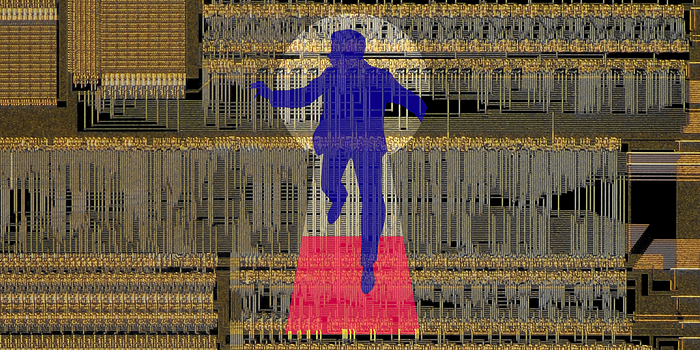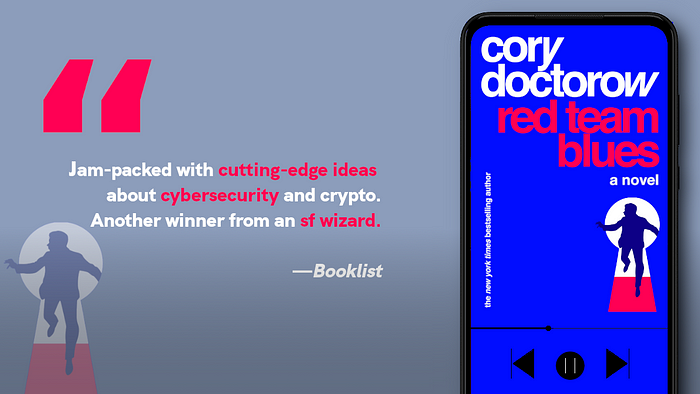Silicon Valley Noir
Red Team Blues and the Role of Bitterness in Technothrillers.

My next novel is Red Team Blues, an anti-finance finance thriller starring Martin Hench, a high-tech forensic accountant who’s spent 40 years busting Silicon Valley grifters large and small.
At 67, Marty’s seen it all, and while he is full of compassion for the victims of the scams he unwinds, his overwhelming feeling is bitterness. As he says in the opening pages of the book, after landing a job that will change his life:
Truth be told, I also didn’t want to contemplate the possibility that, at the age of sixty-seven, the new work might stop coming in. Silicon Valley hates old people, but that was okay, because I hated Silicon Valley. Professionally, that is.
Red Team Blues is the first volume in the Martin Hench series, a series that runs in reverse chronological order. The next book, The Bezzle (Feb. 2024) is set in the mid-2010s, while the third, Picks and Shovels (Jan. 2025) is Marty’s origin story, starting in the early 1980s when Marty drops out of MIT and comes west to San Francisco in the first heroic years of the PC revolution.
Marty’s semi-voluntary defenstration from MIT is caused by his fascination with technology, which may seem ironic. But it’s a common tale —filmmakers drop out of film school because they love film, writers drop out of MFAs because they love writing, and technologists drop out of elite engineering programs because they love technology.
Many of us have experienced that youthful, all-consuming love for a tool or practice that seems to frame the whole world and promises to define our lives. It’s a heady feeling, one that makes us impatient with the plodding, formal methods of institutional instruction, which is so often backwards-looking and of limited relevance to a fast-changing world.
For Marty, dropping out and enrolling in community college to become a CPA is the right call. His love of spreadsheets is intrinsically tied to that sense of excitement about the future, because at their heart, spreadsheets are vehicles for imaginative exercises about what may come: merely model the flows of some activity or process, then change your assumptions and see what happens.
In other words, a spreadsheet is a way of answering Heinlein’s canonical three science fictional questions:
- What if?
- If only…
- If this goes on…
At community college, Marty has a thunderbolt realization: the futuristic exercises that all of his classmates are interested in involve figuring out ways that spreadsheets can hide money, but only Marty is thinking about how to use them to find money.
In this exercise, Marty will always have the upper hand. To hide money, his adversaries will have to make no mistakes that Marty can exploit. For Marty to find that money, he won’t have to be perfect, he’ll merely have to find his enemies’ imperfections.
Marty has the “attacker’s advantage.” In war-games where defense plays the “blue team” and the attackers play the “red team,” the red team always enjoys this advantage.
Marty loves playing for the red team, but over the sweep of his career, he finds himself increasingly on the defensive (hence Red Team Blues).
That’s because — attacker’s advantage or no — the people who want to use technology as a source of empowerment, connection, and collective action have lost to our enemies, who want to use technology for surveillance, extraction and control.
For now, at least.
When I set out to write a noir series, I went back to the classics, the old favorites that I hadn’t read in decades, writers like Chandler and Hammett.
Going back to old favorites is a weird exercise. I remember reading an interview with Edward Neumeier about his script for Starship Troopers, describing how he remembered the original Heinlein novel as a kind of fast-paced action-adventure thriller about massive set-piece battles with alien monsters. But when he actually went back and re-read the novel, he discovered while that those battles make up the beginning and end of the novel, the meat of the book is a bunch of boring lectures about whether only soldiers should be allowed to vote.
I remembered those hard-boiled novels as plot-forward, pacey books about two-fisted heroes beating all the odds to defeat deliciously evil villains. I thought of them as Ur-pulps, as William Gibson told The Paris Review:
The only kind of ghetto arrogance I can summon up from being a science fiction writer is, I can do fucking plot. I can feel my links to Dashiell Hammett. If I meet some guy who subsists on teaching writing in colleges, and if there’s any kind of hostility, I think, I can do plot. I’ve still got wheels on my tractor. The great thing is when you’re doing the other stuff and you whip the plot into gear, then you know you’re driving something really weird.
Gibson’s not wrong here. These books have got wheels on their tractors. They can do fucking plot.
But what I had either missed or forgotten about those books was the bitterness of the noir hero. I remembered their affect as being wry, smart-assed, even dry. But the bitterness surprised me.
What surprised me more was the source of that bitterness. The median noir detective is a veteran of either World War I (if the action is set in the interwar years) or World War II (for midcentury settings) and the thing they are just smouldering with rage at is the way that the America they fought for has changed.
They left an America where the right people were running the show — affluent white guys who evinced a priggish moral code. They come back to an America where women, Black and brown people and queers are visible and unashamed of it. They come back to an America where the rich have revealed themselves to be deviants and perverts.
The affect of the noir hero is bitterness over progress.
Much like Edward Neumeier discovering to his dismay that the beloved cracking space-battle novel of his boyhood was actually a reactionary, book-length antidemocratic screed, revisiting those noir novels made me realized that those hard-boiled tough-guys I loved were reactionary creeps.
Science fiction has its share of reactionary creeps, both among writers and readers. But science fiction itself need not be reactionary: it can be a radical literature of transformation, solidarity and transcendent human thriving.
And both of these affects can use the same tropes. The difference between a dystopia and a utopia isn’t the furniture on the set, it’s how the characters relate to it.
Marty Hench is a bitter, hard-boiled detective.
But Marty’s not bitter because the Silicon Valley he believed in has been poisoned by marginalized people who love technology as much as he ever did.
He’s bitter because the finance bros — always the serpents lurking the technology’s Eden — have won. The wrong people are in charge: not the people who encounter technology and vow to use it in the struggle to set everyone free. These are the people who see technology and start scheming to use it to hold us all hostage, to spy on us, and to suck us dry.
Marty isn’t angry about pluralism and progress. Instead, he’s powerfully, profoundly enraged about enshittification. Maybe you can relate.
Forgive me for tooting my own horn, but Marty Hench is a great noir hero. The engine of noir — that bitterness about a fallen world — need not be reactionary. It can be hopeful.
Others agree. Here’s Booklist’s assessment:
Doctorow’s novels are always feasts for the imagination and the intellect, and this one is no exception: it’s jam-packed with cutting-edge ideas about cybersecurity and crypto, and its near-future world is lovingly detailed and completely believable. Another winner from an sf wizard who has always proved himself adept at blending genres for both adults and teens.
And here’s Library Journal:
The sincere and intelligent writing has a noir feel to it, enhanced by Marty’s dry humor. There’s a sense of satisfaction as this unassuming retired man dishes out comeuppance.
Indeed, Red Team Blues has swept the trade press, with starred reviews all round. I can’t wait for April 25, when it goes on sale.
If this sounds exciting to you and you’d like to pre-order a copy, the best way to do that is through the Kickstarter I’m running to pay for an independent audiobook production with Wil Wheaton (we go in the studio to start recording tomorrow!).
(I have to do these Kickstarters because Amazon — precisely the kind of tech monopolist that Marty is so angry about — refuses to sell my work because it isn’t enshittified with their Digital Rights Management).

Cory Doctorow (craphound.com) is a science fiction author, activist, and blogger. He has a podcast, a newsletter, a Twitter feed, a Mastodon feed, and a Tumblr feed. He was born in Canada, became a British citizen and now lives in Burbank, California. His latest nonfiction book is Chokepoint Capitalism (with Rebecca Giblin), a book about artistic labor market and excessive buyer power. His latest novel for adults is Attack Surface. His latest short story collection is Radicalized. His latest picture book is Poesy the Monster Slayer. His latest YA novel is Pirate Cinema. His latest graphic novel is In Real Life. His forthcoming books include Red Team Blues, a noir thriller about cryptocurrency, corruption and money-laundering (Tor, 2023); and The Lost Cause, a utopian post-GND novel about truth and reconciliation with white nationalist militias (Tor, 2023).
